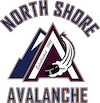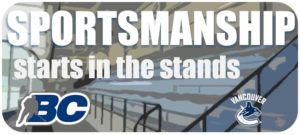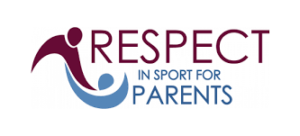Risk and Safety (HCSP Safety Person)
Risk and Safety Overview
The NSFIHA makes safety and well-being our top priority for players, parents, coaches, team staff and officials. Safety not only involves protecting our players from physical injuries and responding pro-actively to incidents like concussions, but also ensuring the social and mental wellness of our community members in dressing rooms, stands and club gatherings. We are committed as an association to making our community safe from all forms of bullying, abuse, discrimination and harassment.
If anyone witnesses a situation that is unsafe, offensive or emotionally distressing to any of our members, it is essential that you report it to the appropriate Avalanche official so prompt follow-up can take place. We have to support each other and be leaders in ensuring the safety and well-being of everyone in our community.
Here are 6 ways the NSFIHA works hard to ensure our community safety, respect and wellness:
1. Team Safety Person (see role resources below)
All NSFIHA teams must have a designated safety person or HCSP that has completed the Hockey Canada Safety Program online course within the last 3 years. The team safety person(s) is responsible for
- Checking player equipment
- Promoting proper warm up and conditioning techniques as a form of injury prevention.
- Coordinating plans for road trips, tournaments, etc. and assisting in the overall supervision of the team.
- Stocking and carrying an appropriate team first aid kit and ensuring it is with the team on every outing.
- Having access to team emergency contact and medical history records via your NSFIHA ePACT and carrying/having access to these files for every team outing
- Facilitating and/or supporting team first aid and health care as needed; soliciting the support of qualified first aid attendants or EMS when required
- Implementing an Emergency Action Plan for the team when dealing with accidents, injuries and medical emergencies.
- Managing all injuries, learning to recognize serious injuries and referring injured players to qualified professionals.
- Taking a leadership role in promoting the values of safety, fair play and integrity.
For more information, and to access the HSCP course, please visit the BC Hockey website here.
2. Respect in Sport (RIS)
All NSFIHA team officials (coaches, managers and safety persons) must complete the RIS online course, which consists of six 30 minute modules designed as a tool to assist team officials in identifying and dealing with abuse, neglect, harassment and bullying in sport.
BC Hockey also offers a Respect in Sport Parent Program, which NSFIHA parents are strongly encouraged to complete. For more information, and to access the RIS online course or online parent program, please visit the BC Hockey website here.
3. Criminal Record Checks
All NSFIHA team officials (coaches, managers and safety persons) must have on file with NSFIHA a current criminal record check. Volunteers wishing to apply for a criminal records check should contact our Safety and Risk Manager first at safety@northshoregirlshockey.com to get the required details.
4. CATT: Concussion Awareness Training Tool
All NSFIHA team officials (coaches, managers and safety persons) must complete the CATT Concussion Awareness Training. CATT includes video lessons and resources to effectively prevent, recognize and manage player concussions and recovery. The CATT resource link can be found on the BC Hockey website here.
5. ePACT
The NSFIHA uses the online tool ePACT to store and share emergency contact and health information for players. ePACT connects our coaches, managers, HCSP, and players’ families through a highly secure, online network, allowing us to access critical information and communicate in case of emergency. Whether it is an illness or injury of one of our players, or an evacuation or power outage impacting an entire team, ePACT helps us better support our players and connect with their families and emergency contacts. See more details about using ePACT below under resources and in the resource pages for Parents and Team Managers.
If you have questions regarding ePACT, team safety or information privacy, please contact your team HCSP or the NSFIHA Risk and Safety Coordinator.
6. NSFIHA Team Dressing Room Policy and More
The NSFIHA Team Dressing Room Policy applies the "Two Deep Policy" in dressing rooms and other "closed" spaces when working with youth. This policy arranged through the supervision of "Den Moms" ensures the proper supervision, safety and well-being for all -- players, parents, coaches and volunteers. Cell phone use is not permitted in dressing rooms.
In addition to the dressing room policy, these are a few other NSFIHA policies that promote safety and well-being which must be supported by all players, parents, coaches and team officials at all times:
- NSFIHA Harassment & Abuse Policy & Procedure
- NSFIHA Fair Play Policy & Code
- NSFIHA Complaint Handling Policy and Procedures
7. COVID-19 Return to play Safety Plan and Expectations
Please see our COVID-19 Updates page for the current safety plans and protocols. All HCSPs and team official are also required to complete a Hockey Canada Return to Hockey COVID-19 Safety Course for the 2020-2021 season.
8. On-Going Association Risk and Safety Assessment
The NSFIHA also conducts several programs annually through Hockey Canada to promote safe hockey and a safe environment for all.
For more information about NSFIHA safety, well-being and risk management, please contact our Avalanche Safety and Risk Manager.
HCSP Team Safety Person Requirements
All team staff are required to complete basic certification/courses and the Code of Conduct in order to be eligible to act as a coach, team manager or HCSP team safety person. In addition, in order to qualify to be the team safety person, volunteers must complete theAll NSFIHA teams must have a designated safety person or HCSP that has completed the Hockey Canada Safety Program online course within the last 3 years, even if the individual is a medical professional. The following is required prior to the start of the season (see full details and links posted below):
- Criminal Record Check
- Respect in Sport (RIS)
- Hockey Canada Safety Program (HCSP)
- Concussion Awareness Training Tool (CATT)
- Fair Play Code of Conduct
- Mandatory Return to Hockey COVID-19 Safety Course 2020-2021 season
Once completed, courses will appear in each person's Hockey Canada portfolio and can be accessed by the Association to verify.
The HCSP team safety person(s) is responsible for:
- Checking player equipment
- Promoting proper warm up and conditioning techniques as a form of injury prevention.
- Coordinating plans for road trips, tournaments, etc. and assisting in the overall supervision of the team.
- Stocking and carrying an appropriate team first aid kit and ensuring it is with the team on every outing.
- Having access to team emergency contact and medical history records via your NSFIHA ePACT and carrying/having access to these files for every team outing
- Facilitating and/or supporting team first aid and health care as needed; soliciting the support of qualified first aid attendants or EMS when required
- Implementing an Emergency Action Plan for the team when dealing with accidents, injuries and medical emergencies.
- Managing all injuries, learning to recognize serious injuries and referring injured players to qualified professionals.
- Taking a leadership role in promoting the values of safety, fair play and integrity.
For any questions regarding these elements, please speak to the Risk and Safety Coordinator or your Division Coordinator.



